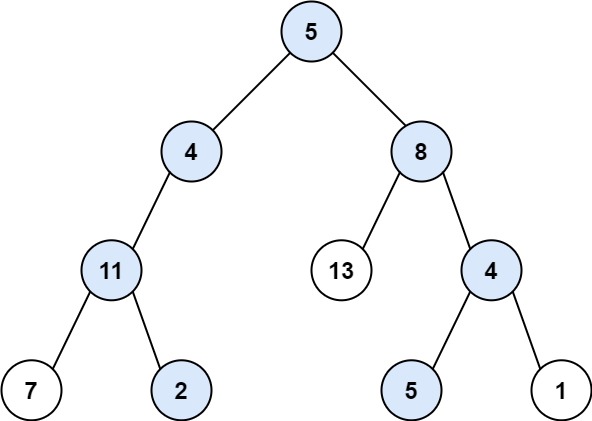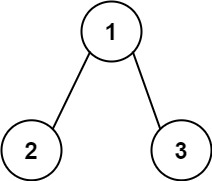Path Sum II
Problem Statement - link #
Given the root of a binary tree and an integer targetSum, return all root-to-leaf paths where the sum of the node values in the path equals targetSum. Each path should be returned as a list of the node values, not node references.
A root-to-leaf path is a path starting from the root and ending at any leaf node. A leaf is a node with no children.
Examples #
Example 1:

Input: root = [5,4,8,11,null,13,4,7,2,null,null,5,1], targetSum = 22
Output: [[5,4,11,2],[5,8,4,5]]
Explanation: There are two paths whose sum equals targetSum:
5 + 4 + 11 + 2 = 22
5 + 8 + 4 + 5 = 22
Example 2:

Input: root = [1,2,3], targetSum = 5
Output: []
Example 3:
Input: root = [1,2], targetSum = 0
Output: []
Constraints #
- The number of nodes in the tree is in the range
[0, 5000]. -1000 <= Node.val <= 1000-1000 <= targetSum <= 1000
Solutions #
/**
* Definition for a binary tree node.
* struct TreeNode {
* int val;
* TreeNode *left;
* TreeNode *right;
* TreeNode() : val(0), left(nullptr), right(nullptr) {}
* TreeNode(int x) : val(x), left(nullptr), right(nullptr) {}
* TreeNode(int x, TreeNode *left, TreeNode *right) : val(x), left(left), right(right) {}
* };
*/
class Solution {
public:
vector<vector<int>> res;
vector<int> sub;
void rc(TreeNode* root, int target, int sum){
if(!root->left and !root->right){
sub.push_back(root->val);
sum += root->val;
if(sum == target) res.push_back(sub);
sum -= root->val;
sub.pop_back();
return;
}
if(root->left){
sub.push_back(root->val);
rc(root->left, target, sum+root->val);
sub.pop_back();
}
if(root->right){
sub.push_back(root->val);
rc(root->right, target, sum+root->val);
sub.pop_back();
}
}
vector<vector<int>> pathSum(TreeNode* root, int targetSum) {
if(!root) return res;
rc(root, targetSum, 0);
return res;
}
};